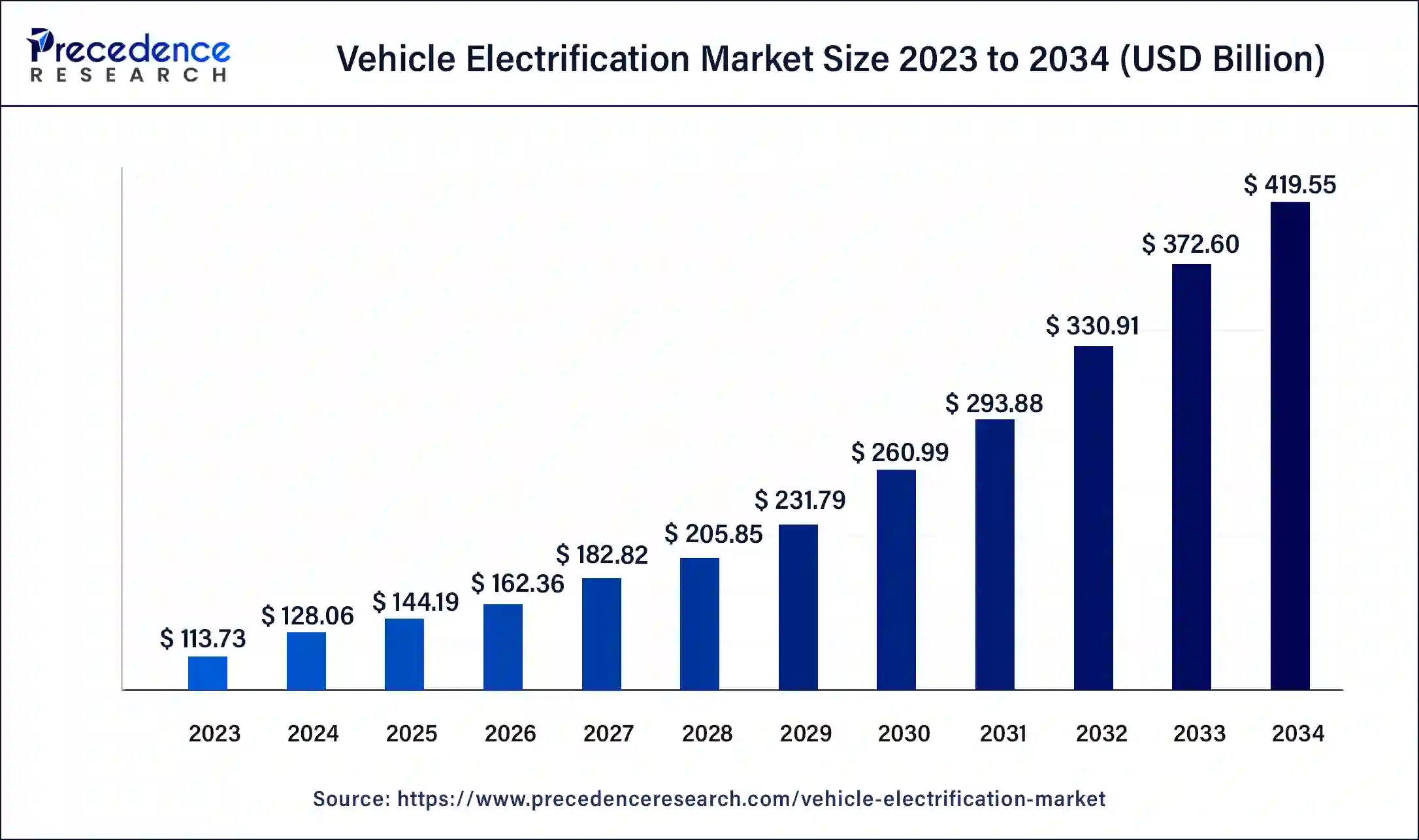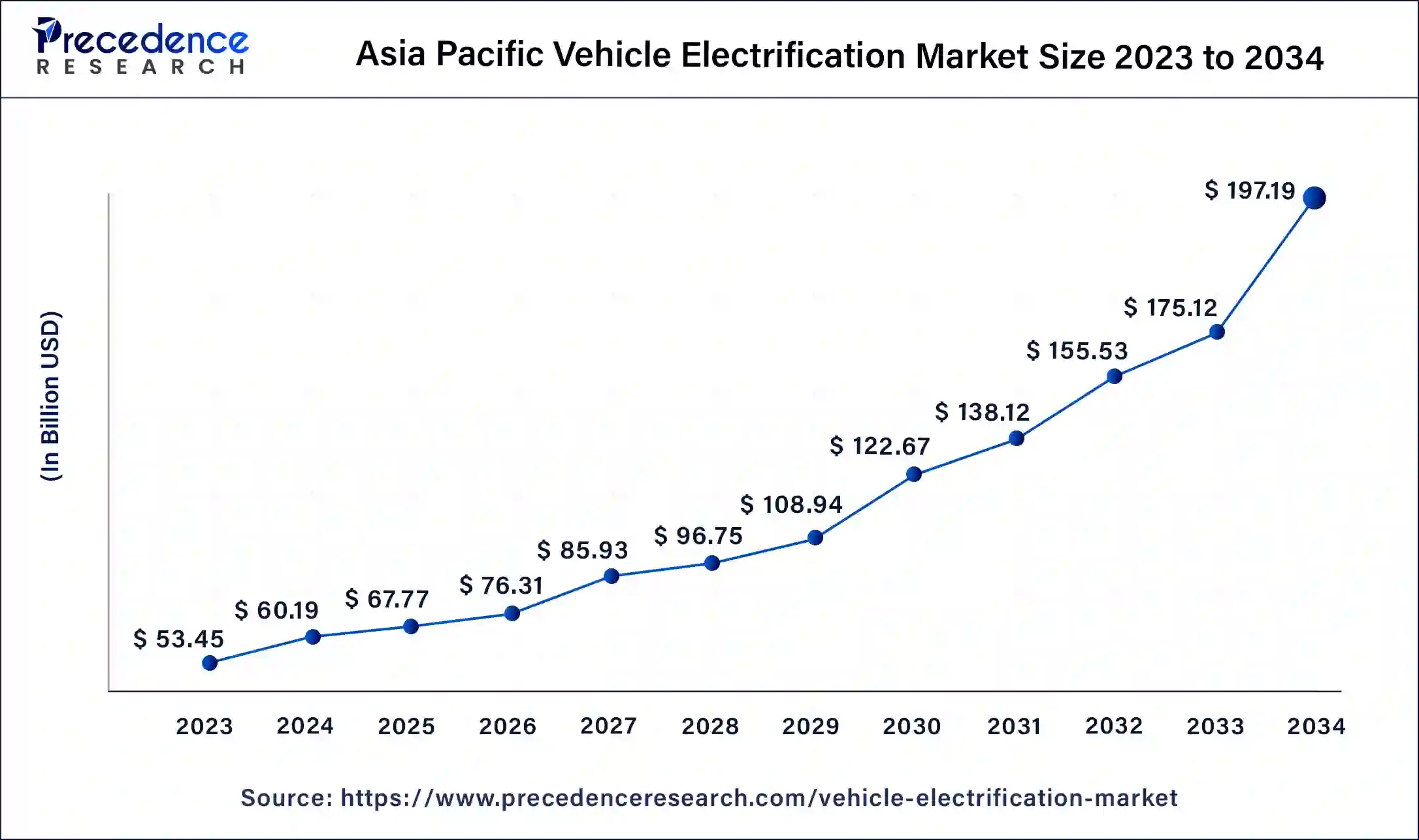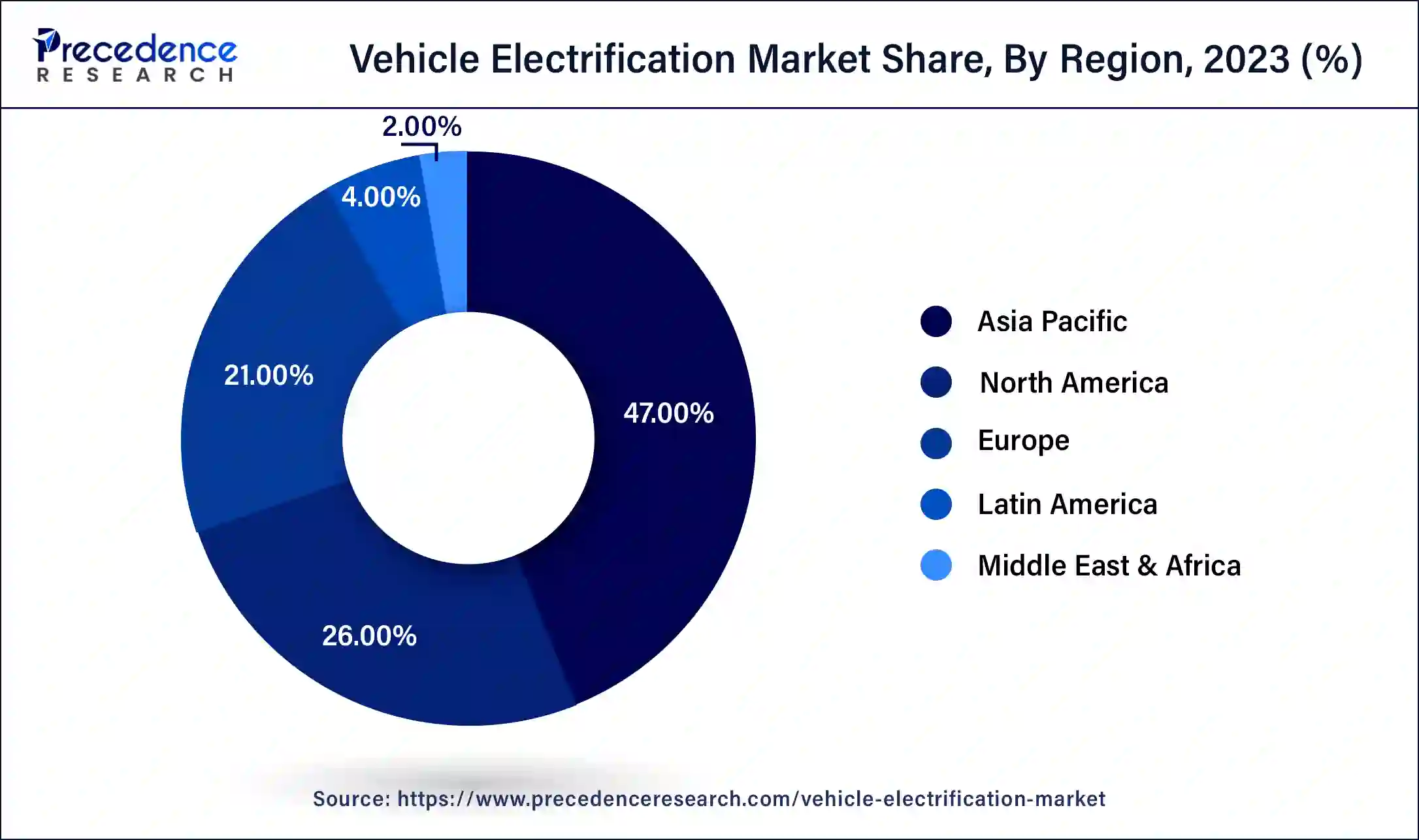Vehicle Electrification Market Size and Forecast 2025 to 2034
The global vehicle electrification market size was estimated at USD 128.06 billion in 2024 and is predicted to increase from USD 144.19 billion in 2025 to approximately USD 419.55 billion by 2034, expanding at a CAGR of 12.6% from 2025 to 2034.

Vehicle Electrification Market Key Takeaways
- The Asia-Pacific led the global market with the highest market share of 47% in 2024.
- North America is expected to reach at a CAGR of 10.9% over the forecast period.
- By hybridization, the ICE segment has captured a revenue share of 61% in 2024.
- The PHEV segment is poised to grow at a CAGR of 14.7% over the forecast period.
- By product, the electric power steering (EPS) segment has captured a 12.5% revenue share in 2024.
- The electric vacuum pump segment is growing at a CAGR of 12.4% over the forecast period.
AI in the Market
AI is enriching vehicle electrification with smart, safe, and efficient features. AI improves range management, infotainment customization, and driver-assistance features. It helps in maintenance prediction, quality control, and manufacturing for the manufacturers. On an infrastructure level, AI automates the charging processes, balances grid loads, minimizes wait times, and prevents the strain of power distribution. The resource consumption is optimized while energy wastage is minimized, and improvisations on vehicle/Grid interoperability are carried out using AI. In general, AI fosters sustainable mobility by enhancing vehicle performance and Life-cycle cost and by making industries competitive.
Asia Pacific Vehicle Electrification Market Size and Growth 2025 to 2034
The Asia Pacific vehicle electrification market size was estimated at USD 60.19 billion in 2024 and is predicted to be worth around USD 197.19 billion by 2034, at a CAGR of 12.8% from 2025 to 2034.

The Asia Pacific emerged as the market leader with prominent revenue share in the year 2024. High demand for vehicle supplements in China and India propels the market growth in the region. In addition, high per capita income along with rising population in the region stimulates the growth of vehicle electrification in the Asian countries. Rapid adoption of green transportation in Asian countries triggers the adoption of battery-powered vehicles such as BEV, HEV, and PHEV. This again contributes positively towards the market growth.
In terms of revenue, Europe holds second largest position in the global vehicle electrification market. The governments of France, Germany, UK, Italy, and other European countries focus on sustainable development in infrastructure growth, thisoffers significant opportunity for the market players to flourish their business.

Market Overview
According to the International Energy Agency, in 2023, global electric car sales soared by 35% year-on-year, increasing to almost 14 million new cars. While demand remained largely concentrated in China, Europe, and the United States, growth also picked up in some emerging markets such as Vietnam and Thailand, where electric cars accounted for 15% and 10%, respectively, of all cars sold.
Vehicle Electrification Market Growth Factors
- The ever-increasing acceptance of electric vehicles has propelled the demand for electrification, primarily due to their lower emissions and sustainability agendas.
- The market sees faster growth from the cost efficiency associated with reduced fuel consumption, minimal maintenance, and fewer moving parts.
- Lightweight components offer improvements to power-to-weight ratios, thereby enhancing performance and vehicle range.
- Several government policies, subsidies, and investments in charging infrastructure have led to a more conducive environment for growth in these markets.
- Increased demand for vehicle electrification technology comes from consumers who want green, connected, and efficient mobility solutions.
Market Scope
| Report Coverage | Details |
| Market Size in 2024 | USD 128.06 Billion |
| Market Size in 2025 | USD 144.19 Billion |
| Market Size by 2034 | USD 419.55 Billion |
| Growth Rate from 2025 to 2034 | CAGR of 12.6% |
| Largest Market | Asia Pacific |
| Fastest Growing Market | Europe |
| Base Year | 2024 |
| Forecast Period | 2025 to 2034 |
| Segments Covered | Product Type, Hibridization Type, Region Type |
| Regions Covered | North America, Asia Pacific, Europe, Latin America, Middle East and Africa |
Value chain analysis
- Raw Material Sourcing (Steel, Plastics, Electronics): The procurement methods for essential elements like lithium, cobalt, nickel, steel, plastics, and semiconductors to manufacture EV components.
Key players: CATL and LG
- Component Manufacturing (Engines, Transmissions, etc.): It is the manufacturing of specialized electric vehicle parts like battery packs, electric motors, power electronics, and control systems that replace traditional internal combustion engine parts.
Key players: Bosch, NVIDIA, CATL
- Vehicle Assembly and Integration: This includes the final assembly of the electric vehicle by combining all the manufactured parts comprising chassis, power train, battery, and body panels.
Key players: Tata Motors, Mahindra & Mahindra, Maruti Suzuki
- Testing and Quality Control: This includes the testing of electric vehicles and their components for performance, electrical safety, endurance, and standard specification conformity.
Key players: TÜV SÜD, Bureau Veritas, SGS, DEKRA
- Distribution of Dealers and OEMs: This is the process under which finished vehicles and replacement parts are delivered to dealers and other OEMs, supported by changing supply chain models.
Key players: Tata Motors, Mahindra Electric, BYD, and Ford
Product Insights
Electric Power Steering (EPS) witness high demand in 2024 and expected to grow at a significant rate during the forecast period. Auto manufacturers are also switching towards electric power steering due to its primary benefits such as enhanced fuel economy in conventional ICE that is estimated to be the key factor driving the demand for EPS in automotive application. In addition, the extra comfort offered by the EPS system to the driver is the other potential driving factors that significantly boost the market growth. Presently, EPS is the most preferred steering system over the conventional Hydraulic Power Steering (HPS) as it is lighter and smaller along with the technology assist with computer-controlled electric motor in a vehicle. This efficiently eliminates the conventional components and result in energy-efficient solution for automobile. The aforementioned factors propel the market growth for the EPS system in the global market.
On the other hand, electric oil pump exhibit the fastest growth over the forecast period. The electric oil pump has an effective mechanical integration that fuels its application in the automotive sector. This results in equal distribution of oil in the required parts of the engine along with other parts of the vehicle.
Hybridization Insights
Internal Combustion Engine (ICE) & Micro-Hybrid Vehicle dominated the global vehicle electrification market in the year 2024 and expected to witness a substantial growth in the coming years. In these vehicles, the electric motor is furnished with an ICE that helps it to shut-down immediately when the vehicle is stopped or brake is applied. The electric motor used in micro-hybrid vehicles replaces the conventional alternators and starters, thereby improves the fuel economy by reducing fuel consumption.
Plug-in Hybrid Electric Vehicle (PHEV) registered the highest growth over the analysis period. High fuel efficiency along with low maintenance and operational cost of the vehicle are the key factors attributed for the significant growth of the segment in the years to come. Furthermore, integration of electric engine with the ICE empower the vehicle with long driving range and fuel refilling or recharging flexibility. Government has also issued several norms related to decarbonization and environment safety that again propels the demand for PHEV during the forecast period.
Vehicle Electrification Market Companies
- Continental
- Valeo
- Robert Bosch GmbH
- Denso
- Mitsubishi Electric Corporation
- Johnson Electric
- Delphi Automotive PLC
Key Companies Share Insights
The global vehicle electrification market is highly competitive, though seeks consolidation owing to large value share occupied by few top market players. These companies are mainly emphasized towards product enhancement, new product development, and expansion strategies for cementing their position in the global market.
Recent Developments
- In April 2025, Aramco and BYD, a Chinese electric vehicle manufacturer, signed a joint development agreement to explore advancements in new energy vehicle technologies. The collaboration between Saudi Aramco Technologies Co. and BYD aims to develop solutions that reduce environmental impact and enhance efficiency.
- In April 2025, the Kerala State Electricity Board (KSEB) in India announced its plan to collaborate with IIT Bombay to implement a pilot project for integrating Vehicle-to-Grid (V2G) technology into the state's energy system. This initiative aims to enhance the grid's stability by allowing electric vehicle batteries.
- In April 2025, Virši announced the completion of the national EV charging rollout in Latvia. The company has installed 28 high-speed charging points across 20 fuel stations in the country as part of a nearly three-year infrastructure project. Backed by co-financing from the European Union's Alternative Fuels Infrastructure Facility (AFIF), the initiative positions the company as a regional leader in alternative fuel infrastructure. 
Segments Covered in the Report
By Product
- Electric Power Steering (EPS)
- Integrated Starter Generator (ISG)
- Start/Stop System
- Electric Air Conditioner Compressor
- Liquid Heater Ptc
- Electric Oil Pump
- Electric Vacuum Pump
- Starter Motor & Alternator
- Electric Water Pump
- Actuators
By Hybridization
- Internal Combustion Engine (ICE) & Micro-Hybrid Vehicle
- Battery Electric Vehicle (BEV)
- Plug-in Hybrid Electric Vehicle (PHEV)
- Hybrid Electric Vehicle (HEV)
By Region
- North America
- Europe
- Asia-Pacific
- Latin America
- Middle East & Africa
For inquiries regarding discounts, bulk purchases, or customization requests, please contact us at sales@precedenceresearch.com
Frequently Asked Questions
Ask For Sample
No cookie-cutter, only authentic analysis – take the 1st step to become a Precedence Research client
 Get a Sample
Get a Sample
 Table Of Content
Table Of Content
 sales@precedenceresearch.com
sales@precedenceresearch.com
 +1 804-441-9344
+1 804-441-9344
 Schedule a Meeting
Schedule a Meeting